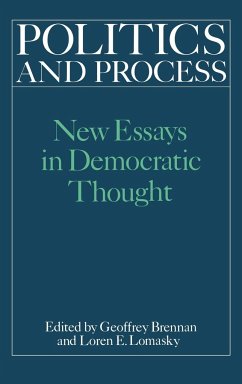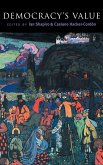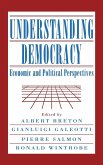Much of the most interesting and controversial work in analyzing democratic institutions over the recent past has its intellectual origins in public choice economics. The political arena provides the analytical framework for the study of human behaviour in markets, and the currency in votes and party competition is a primary mechanism for the implementation of public policy. This book explores the strengths and weaknesses of democratic institutions in a series of essays representing a variety of disciplinary perspectives, which compare the merits of the democratic market with those of more conventional markets. Ultimately, the public choice analysis in these studies leads to a deep-seated political skepticism which must confront the customary unquestioning enthusiasm for democracy. This challenge to its enthusiasts should provoke a more profound understanding of democracy's purposes and, in general, a more refined form of political theorizing.
Table of contents:
Acknowledgments; Introduction Geoffrey Brennan and Loren E. Lomasky; 1. The justification of democracy J. Roland Pennock; 2. Large numbers, small costs: the uneasy foundations of democratic rule Geoffrey Brennan and Loren E. Lomasky; 3. Evaluating the institutions of liberal democracy William Nelson; 4. Democracy: the public choice approach Dennis C. Mueller; 5. The democratic order and public choice Peter H. Aranson; 6. Radical federalism: responsiveness, conflict, and efficiency David Osterfeld; 7. Contractarian presuppositions and democratic governance James M. Buchanan; 8. In quest of the social contract James S. Fishkin; 9. Rationality and the justification of democracy Jules Coleman; 10. The morality of democracy and the rule of law Shirley Robin Letwin; Index.
Much of the most interesting and controversial work in analyzing democratic institutions over the recent past has its intellectual origins in public choice economics. This book explores the strengths and weaknesses of democratic institutions in a series of essays representing a variety of disciplinary perspectives, which compare the merits of the democratic market with those of more conventional markets.
This book explores the strengths and weaknesses of democratic institutions.
Hinweis: Dieser Artikel kann nur an eine deutsche Lieferadresse ausgeliefert werden.
Table of contents:
Acknowledgments; Introduction Geoffrey Brennan and Loren E. Lomasky; 1. The justification of democracy J. Roland Pennock; 2. Large numbers, small costs: the uneasy foundations of democratic rule Geoffrey Brennan and Loren E. Lomasky; 3. Evaluating the institutions of liberal democracy William Nelson; 4. Democracy: the public choice approach Dennis C. Mueller; 5. The democratic order and public choice Peter H. Aranson; 6. Radical federalism: responsiveness, conflict, and efficiency David Osterfeld; 7. Contractarian presuppositions and democratic governance James M. Buchanan; 8. In quest of the social contract James S. Fishkin; 9. Rationality and the justification of democracy Jules Coleman; 10. The morality of democracy and the rule of law Shirley Robin Letwin; Index.
Much of the most interesting and controversial work in analyzing democratic institutions over the recent past has its intellectual origins in public choice economics. This book explores the strengths and weaknesses of democratic institutions in a series of essays representing a variety of disciplinary perspectives, which compare the merits of the democratic market with those of more conventional markets.
This book explores the strengths and weaknesses of democratic institutions.
Hinweis: Dieser Artikel kann nur an eine deutsche Lieferadresse ausgeliefert werden.








